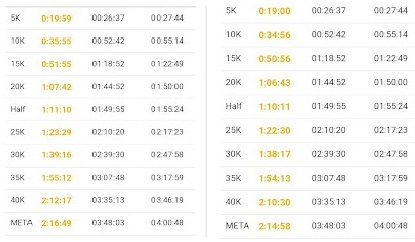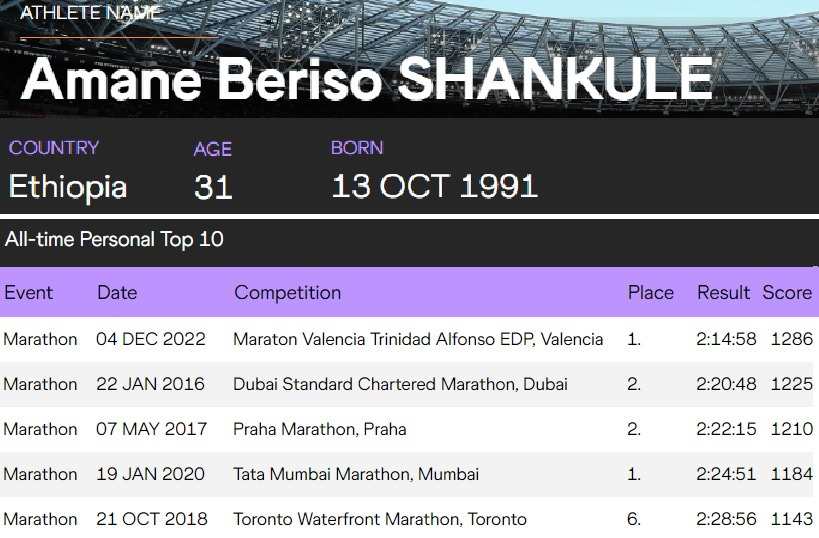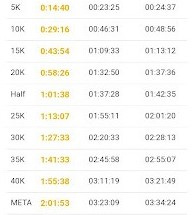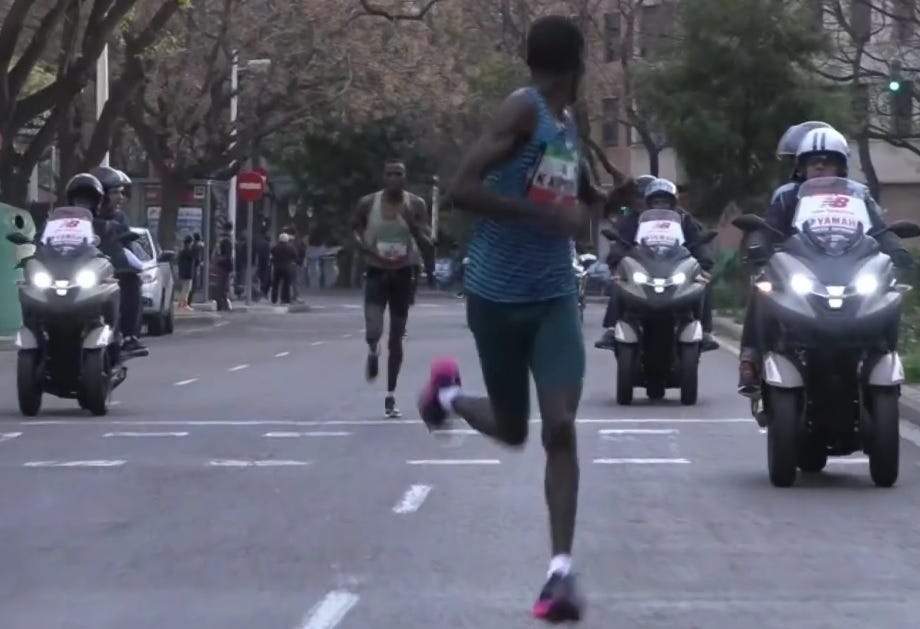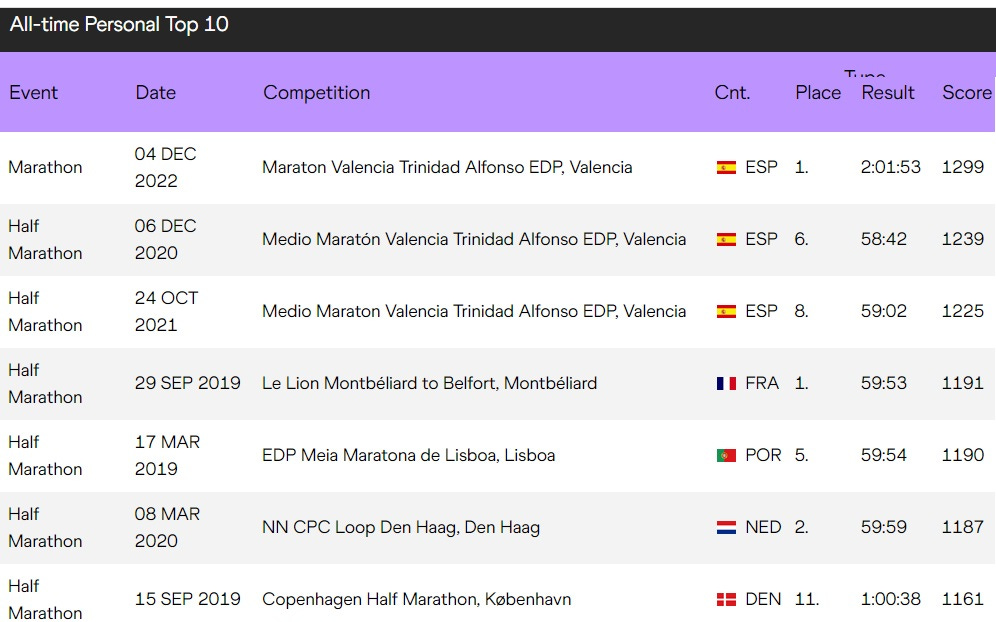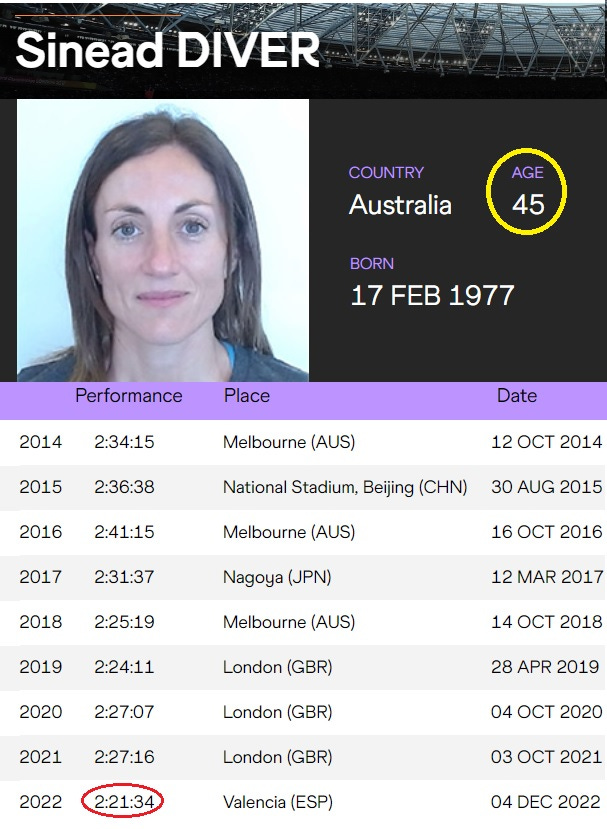The 2022 Valencia Marathon was a choose-your-own-splits adventure for the winners
Blood runs thicker than yogurt, and not just in East Africa
It was easy to predict how Letesenbet Gidey would chase Brigid Koskei’s world record of 2:14:04 at the Valencia Marathon on Sunday. With history as a guide—although Gidey had raced just twice on the roads, both races were negative-split world records—she would start at a modest pace and pick it up somewhere after halfway. The only question, given Gidey’s apparent capacity to not merely break but obliterate the world record, was what a “modest” initial pace would mean.
Sparse and misleading information on the video feed made it difficult to determine how close to world-record pace Gidey and her unexpected shadow, fellow Ethiopienne Amane Beriso, actually were throughout the race. I don’t know how many others were seeing the same feed I was—it may have been the same one for all of us*—but on The Olympic Channel, the coverage was bad. Not because of the announcers, but because the basic production side failed at things that are easy to not mess up.
For example, despite the assurance of a world-record attempt by someone perfectly poised for a successful one, most of the 5K split times were provided so late as to be useless. Worse, the “world-record pace” times were often way off, because rather than provide times at 5K, 10K, 15K, and so on corresponding to 2:14:04 marathon pace, the producers showed the splits that Brigid Koskei ran when she broke the world record in Chicago three years ago.
Because these splits were so erratic—Koskei was on 2:10:31 pace at 5K, yet wound up running nearly even halves of 1:06:59 and 1:07:05—viewers not busy doing their own calculations had no honest sense of whether Gidey and Beriso were on target, and at various points were erroneously led to believe Gidey and Beriso were speeding up or slowing down more than they were. And it was clear the announcers were confused by the producers’ arrangement, too.
To my knowledge, there was no way to track the leaders in real time without downloading the Valencia Marathon app. As a natural consequence of hating smartphones and mistrusting the makers of data-sniffing, ad-loaded apps, I absolutely hate the trend of forcing people to use apps to monitor in-progress race results, get in-store discounts, and on and on.
On the plus side, the feed was free and functional. But the overall result was a clown-show of a webcast. And it gets worse.
I downloaded the app yesterday to get some of the leaders’ splits. The ones I saw for the elite women were wrong, and by a fixed amount at each checkpoint. So in writing this, I’m relying on things I remembered while watching the race live (a replay is available here).
Gidey and Beriso went through 5K in 16:08 and were together for every split after that through 35K. Their listed splits from the app are below and indicate that Gidey’s are offset from reality by +3:51 and Beriso’s by +2:52 through 40K.
That graphic kind of spoils the suspense in the event you don’t yet know the outcome. Gidey went through halfway in 1:07:19, and between 20K and 30K ran 31:34 (5:04.8 per mile; 2:13:12 marathon pace) to reach 30K in 1:35:24, 2:14:12 pace. She was still outside world-record schedule (pronounced “shed-yool”) but moving in the right direction.
But there alongside or a half-stride behind was Beriso, who carried a personal best of 2:20:48 from nearly seven years ago into the race and whose fastest marathon in the past five years was 2:24:51 (she did run 2:25:05 at an elevation of at least 7,000’ in Mexico City in August).
In case the other graphic failed to spoil the suspense as advertised, this one should. And how a 31-year-old Ethiopian managed to revive her career in such an emphatic manner is a mystery, but I would be quick to credit the usual suspects of an improved diet, weight training, more sleep, a can-do attitude, a coaching change, and present or future motherhood.
Beriso and Gidey slowed to a 15:56 (5:08 pace) between 30K and 35K, and then the day rapidly darkened for the heavy but untested favorite. Beriso pulled far ahead despite slowing to 16:17 in the next 5K, which Gidey—still accompanied by her pacesetters, who by this point were punching each other in the face to stay awake—covered in 17:05. Gidey folded so badly that she ran her final 2.2K at 6:08 pace, a crawl for an athlete at her level.
The 24-year-old Gidey looked more like a victim of classic substrate failure—i.e., “bonking”—than of inexperience. She’ll be back next fall after the World Track and Field Championships and better fueled.
The splits from the app for surprise men’s winner Kelvin Kiptum are real, and boy, are they spectacular.
Splits of 1:01:38 and 1:00:15 are cartoonish on their own. But with the 28:05 10K late in the race (4:31 per mile; 1:58:30 marathon pace), they also require a laugh track.
This was Kiptum’s first finish of the year. Where has he been since dropping out of a race in January? Probably staying far away from other Kenyans to avoid contracting a positive test for triamcinolone, as well as getting more protein immediately after long runs, adding more naps, upping the length of his tempo runs, and embracing the joys of being a current or speculative family man (he’s only 23).
What made Kiptum’s sudden acceleration—the shock of which almost brought pre-race favorite Tamirat Tola to a halt so that he didn’t grind himself to pulp in the next mile trying to keep up—even more astonishing was how much he was weaving and looking over his shoulder, not always at the same time. He looked like a well-designed remote-controlled robot whose operator was slightly tipsy. He may have covered 27 miles in all. Word on the street is that he paused briefly to heckle a fat spectator in a HOKA bikini when he passed the 22-mile point, using perfect unaccented Spanish to deliver his jubilantly cruel remarks.
Maybe Kiptum is the inverse Zersenay Tadese, “lackluster” at the half-marathon but sublime over the whole distance:
There was also the spectacle of an Australian women’s national record by Irish-born sorceress Sinead Diver, who already hated mention of her age over three years ago.
Diver is old enough to be the mother of Brett Robinson (also known as ブレット・ロビンソン) who had just broken Robert de Castella’s 36-year-old men’s Australian record by running 2:07:31 in Fukuoka, Japan. Well, probably; Robinson is 31.
Diver clearly benefits from simply ignoring how old she is. I’d say she also bumped up her mileage recently, but that’s unlikely since she was already doing build-ups that included weeks of up to 125 miles in 2019. She probably also avoids that message board.
The undeniable fact is that someone with Irish ancestry who has secured Australian nationality is just unusually tough. It’s a rare combination that allows for astonishing physical feats at ages when having sex without vasodilators or synthetic lubrication is a faded memory. Seriously, have you ever known anyone from either of those countries who qualifies as soft? Politicians are excluded (and that exclusion is global).
The Valencia races overshadowed the California International Marathon, where hundreds of runners make an almost-annual pilgrimage to run Olympic Trials qualifying times or at least personal bests. On Sunday, 41 U.S. men and 43 U.S. women (and one foreigner of each sex) ran under the Olympic Trials standards of 2:18:00 and 2:37:00, suggesting an exquisite, even statistically unassailable level of equality.
Nine of those men even ran faster than Amane Beriso—racing on a non-aided course—did in Valencia a land-slab and an ocean away on the same morning. It was a weekend of great surprises.

